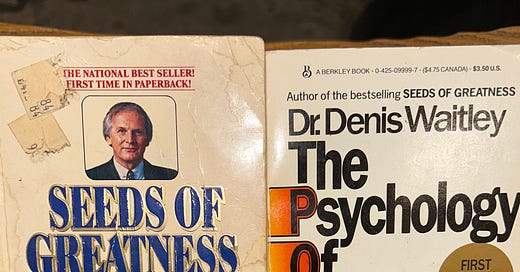Sorry, but he was a fraud...
The original plan for this week’s note was to build on the “Who’s Inspired?” Olympics theme from a couple weeks ago. I was going to write about a book that was important to me as a young man trying to develop a “winning” mindset.
I had planned to talk about how I “found” this book, thanks to someone else’s oversight in leaving it out in a locker room. I was going to describe how I devoured its contents, the message resonating with me on the importance of positive self-talk, the right mental attitude and the inspiration that can go along with trying to achieve big goals.
I would have gone on to describe how I was so inspired by this book that I purchased some of the author’s other books and materials to go even deeper. My note would have described how the author of these books, Dr. Denis Waitley was a graduate of the US Naval Academy, and had gone on to serve as psychologist to astronauts and athletes, inspiring audiences around the world with his message on how to “be a winner” and achieve “greatness.” His message of positivity and the importance of goal-setting helped me get through college with a heavy course load in 4 1/2 years to graduate with honors and 2 bachelor’s degrees.
So when preparing this note, I was curious to see if he was still alive. I did some digging. Turns out he is still alive and now in his 90’s. Unfortunately, it also turns out there was some tarnish on his shiny story of self-help. In my research, I came across a story from The Salt Lake Tribune, a Pulitzer Prize winning newspaper in Salt Lake City, from 2007 (“Report challenges record of former Usana official” by Linda Fantin, April 1, 2007). The article described how Waitley was investigated by a whistleblower who uncovered that he did not actually have a Masters degree as he claimed and that his Ph.D. was from a, now defunct, non-accredited “university” in California. In the wake of this investigation, Waitley resigned his seat on the board of a publicly traded supplement company based in Utah (selling his shares before his departure).
All of this left me scratching my head. In the wake of uncovering such a deception, what’s a leader to do? Whether you’re disappointed in someone you looked up to, or whether you were betrayed by a mentor or authority figure, here are some ways to think about it:
Reevaluate the message. Take the opportunity to look at the offender’s words or message to see if there is still anything salvageable. Even though the author may have been discredited, there may still be some grain of truth in the message. Try to find it.
Make the message your own. Clearly, if this person has lost all credibility, you could use the opportunity to find the “grain of truth” in the message that rang true for you at the time, and just make it your own. Stealing from a discredited person may be opportunistic but if you can make it your own, it’s yours in a new way.
Obviously, you can also totally disregard the message and the messenger. In fact, you may need to just distance yourself from both before you can make sense of the entire event. After enough time passes, you may still be able to go back to #1 or #2 with fresh eyes and an open mind. This is the problem with credibility - once it is questioned, it is questioned for everything, even though the infraction may have been very limited.
Robert Greene, in his classic The 48 Laws of Power, states in Law #5, “So much depends on reputation - guard it with your life…make your reputation unassailable.” According to Greene, reputation is one of the keys to power - I wish more people took this advice to heart. This week, think about the reputation you have built with your teams. Work to enhance it. Guard it carefully because it is one of the keys to your success even though it wasn’t one of the “Ten Best-Kept Secrets” of Denis Waitley’s idea of success.




